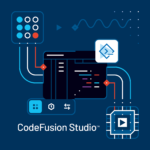
Analog Devices streamlines embedded AI with CodeFusion Studio 2.0
 Cette publication existe aussi en Français
Cette publication existe aussi en Français
Analog Devices, Inc. (ADI) has announced CodeFusion Studio 2.0, the latest version of its open-source embedded development platform designed to simplify and accelerate AI-driven embedded system design. The platform introduces new tools and automation features that allow developers to move from concept to deployment faster and with fewer integration challenges.
For eeNews Europe readers working with ADI processors, microcontrollers, or edge-AI workloads, this release underscores how embedded intelligence is evolving toward faster prototyping, better performance profiling, and seamless software-hardware integration.
Empowering developers with AI-driven workflows
CodeFusion Studio 2.0 enables complete end-to-end AI workflows. Developers can bring their own AI models and deploy them efficiently across ADI’s full hardware range—from ultra-low-power edge devices to high-performance DSPs. Built on Microsoft’s Visual Studio Code, the environment includes a model compatibility checker, performance profiling tools, and optimization capabilities that help ensure robust deployment and faster time-to-market.
A key addition is the Zephyr-based modular framework, which delivers runtime performance profiling for AI/ML workloads. Developers can perform layer-by-layer analysis to fine-tune inference performance and optimize system efficiency. This framework also enables seamless integration with ADI’s heterogeneous platforms, simplifying machine learning deployment while improving visibility into system-level performance.
Unified and scalable development
The new version introduces an upgraded CodeFusion Studio System Planner, which now supports multicore applications and an expanded range of ADI devices. Unified configuration and debugging tools further reduce development complexity across ADI’s ecosystem. Engineers benefit from built-in debugging features, including Core Dump Analysis and GDB (GNU Debugger) support, providing a more intuitive and efficient troubleshooting experience.
According to ADI, CodeFusion Studio 2.0 “embodies its commitment to delivering developer-first tools that simplify complexity and accelerate innovation.” The company sees this release as a step toward a future where embedded systems seamlessly integrate AI at every level, from sensor nodes to system processors.
Future-proofing ADI’s embedded ecosystem
CodeFusion Studio 2.0 also reflects ADI’s long-term strategy to strengthen its open-source embedded development framework. Future versions are expected to deliver deeper hardware-software integration, expanded runtime environments, and new features tailored to “evolving developer needs as they experiment with physical AI.”
With this release, Analog Devices continues positioning itself as a driving force behind the next generation of embedded AI innovation—empowering engineers to build smarter, faster, and more efficient systems across industries.
Source: ADI
 If you enjoyed this article, you will like the following ones: don't miss them by subscribing to :
eeNews on Google News
If you enjoyed this article, you will like the following ones: don't miss them by subscribing to :
eeNews on Google News







